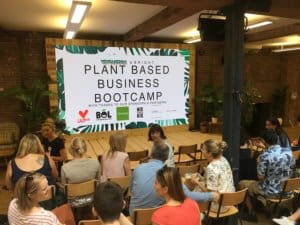What impact will the pandemic have upon the plantbased food industry? Experts from the GFI, Green Monday, Vevolution, Grounded Foods, Innovate 360, Vegan Business Media, and Green Queen Media, give us their inside knowledge from various areas of vegan industry including startups, foodtech, events, sustainability and media.
While hospitality and foodservice are in troubling times, many businesses are adapting by expanding their online services or adding new delivery options. In what other ways will the vegan industry feel the impact?
Although the future is not certain, it seems clear that in this climate of fear, big business will thrive while smaller ventures may or may not survive. Many independent plantbased businesses will be acquired by Big Food as we have already seen taking place this year. There will of course be a huge shift from Bricks and Mortar to online commerce, and food production must of course continue regardless.

Despite the current disaster, certain sectors are seeing increased interest and success in these times, for example with meal kit services, and for alternative proteins such as Just Egg, which is now becoming a serious attraction for Chinese state-backed companies seeking alternative protein sources since the outbreak.
Let’s see what the experts have to say.
Katrina Fox is a PR consultant, speaker, and the founder of Vegan Business Media
“The COVID-19 pandemic has had a major impact on all types of vegan and plant-based businesses. In addition to restaurants and bars and the travel and tourism industries, food manufacturers are seeing revenues decreased.
Now is a time for vegan and plant-based businesses to ‘pivot’ (the new buzzword of 2020!) to try to diversify their income streams. We’re seeing businesses collaborate, for example, in virtual online markets and I anticipate we’ll see more of this. On the plus side, even though some are scrambling to get an online store up and running now, it means they can be more prepared in the future and possibly have an additional stream of income going forward.”
Sonalie Figuerias is the founder of sustainable news platform Green Queen Media
“While the F&B industry has always weathered market ups and downs, the coronavirus is a heretofore unrivalled disruption to their way of doing business. No one could have predicted a world where billions of people are no longer able to go to restaurants by government order. Or that serving your customers puts your servers and staff at serious risk for their health. Nimble/innovative operators across the world have already pivoted by introducing takeout menus, frozen ready-meals, prepped food boxes, selling groceries, introducing snacks and condiments, collaborations with other restaurants (e.g. discounts if you dine with all participating eateries), offering online cooking classes, I fully believe that this will not stop post-corona. Restaurants will do everything they can to majorly diversify their revenue streams from now on, so that should this ever happen again, they will be prepared.”

David Yeung is the founder of Green Monday and arguably the most influential plantbased businessperson in Asia.
“The government will inevitably have to rethink and re-examine the entire food supply chain. They simply can’t afford to have another devastating incident like the coronavirus ever happen again. Wildlife animal consumption clearly should have been banned long ago. Even state-controlled media outlets such as China Daily have published editorials calling for a permanent wildlife trade ban.”
Liz Specht, PhD, is the associate director of science and technology at the Good Food Institute.
“Fortunately, taking animals out of our food system is easier than we may think. As evidenced by the enormous uptick in innovation, availability, and consumer interest in plant-based meats, the whole meat category is being redefined. Meat is increasingly recognized as a sensory experience, characterized by a specific combination of amino acids, fats, and minerals rather than by its means of production. No animal has to be farmed or hunted and no disease has to be risked to enjoy a juicy burger or a crispy nugget.
We are also likely to see cultivated meat (meat grown directly from animal cells, no slaughter involved) enter the market sometime fairly soon, thanks to an influx of talent, investment, and entrepreneurial activity. Both plant-based and cultivated meat products remove the food insecurity and zoonotic disease concerns inherent in animal-based food. Modern plant-based and cultivated meat production gives consumers a painless swap at the dinner table, along with massive underlying benefits in safety and sustainability throughout the supply chain.

Governments are pouring immense resources into therapeutic and vaccine development programs in a frantic attempt at damage control for the current outbreak. But none of this will prevent the next, and potentially even worse, pandemic.”
From an OpEd piece originally published at Wired
Damien Clarkson is the co-founder of Positive Plant-powered movement Vevolution
“It is already clear vegan businesses are going to be hit hard by the COVID-19 crisis. Independent restaurants events and those in food service have already been hugely impacted. In London many restaurants have responded immediately by offering no-contact direct delivery services and operating dark kitchens. However businesses operating virtual marketplaces like The Vegan Kind Supermarket have seen unprecedented demand for products as demand increases on direct to consumer services.
At Vevolution, we’ve had to adapt our plans and have turned our planned Plant Based Business Summit into a series of virtual events. We are personally excited about the global impact this summit can have as we bring the community of entrepreneurs and investors to discuss how we can continue to grow the plant-based economy.”

Veronica Fil is a food industry specialist and economist, as well as founder of vegan cheese startup Grounded Foods.
“For us and many other startups in this climate, however, we need to think very carefully about where we direct resources. Things are moving fast, and we’ve got to move with them. That means taking into account how global trade restrictions may impact every aspect of the supply chain, from ingredients and packaging to transport and logistics. How it may create obstacles as well as new opportunities. In the short term, we also need to look at the channels we’re selling through, and how they might be impacted by social distancing (for example, the reduction in physical patronage to restaurants has resulted in an increase in food delivery and online grocery sales).
The alternative proteins industry was already a hot market before covid-19 hit. My prediction is that these terrifying times will propel the sector’s growth even faster. As borders are locked down, it’s imperative to explore resilient, self-sustaining and local food supply chains. And for the plant based startups who are on the forefront of innovation? Don’t let a turbulent economy hold you back. Now is the time that we need you most.”

Elias Tan is Vice President of Innovate360, Singapore’s 1st food accelerator & incubator
“In nations such as Singapore where land area is scarce, the COVID-19 lock-downs demonstrate the need to increase its food production in an inventive matter. Technology will be an important resource in realizing a strong global food security infrastructure. By tapping into cutting edge vertical aquaculture and agri-tech farming system solutions, countries like Singapore can increase its land productivity and maximise its energy and water resources.
Despite the current bear stock market, the FoodTech space is definitely an attractive future candidate for investment in the light of a food security issue the world is increasingly facing.
According to PitchBook, funding for food tech has skyrocketed from about $60 million in 2008 to more than $1 billion in 2015. And unique investments from VCs and private equity funds have doubled from 223 in 2015 to 459 in 2017, according to CB Insights. With the growing COVID-19 situation, Food Tech companies producing solutions that enhance the world’s food supply in times of calamity would be a choice investment.”





